Related Research Articles

A Wizard of Earthsea is a fantasy novel written by American author Ursula K. Le Guin and first published by the small press Parnassus in 1968. It is regarded as a classic of children's literature and of fantasy, within which it is widely influential. The story is set in the fictional archipelago of Earthsea and centers on a young mage named Ged, born in a village on the island of Gont. He displays great power while still a boy and joins a school of wizardry, where his prickly nature drives him into conflict with a fellow student. During a magical duel, Ged's spell goes awry and releases a shadow creature that attacks him. The novel follows Ged's journey as he seeks to be free of the creature.

Ursula Kroeber Le Guin was an American author best known for her works of speculative fiction, including science fiction works set in her Hainish universe, and the Earthsea fantasy series. She was first published in 1959, and her literary career spanned nearly sixty years, producing more than twenty novels and over a hundred short stories, in addition to poetry, literary criticism, translations, and children's books. Frequently described as an author of science fiction, Le Guin has also been called a "major voice in American Letters". Le Guin herself said she would prefer to be known as an "American novelist".
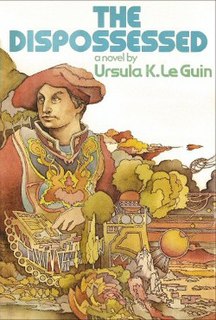
The Dispossessed is a 1974 anarchist utopian science fiction novel by American writer Ursula K. Le Guin, set in the fictional universe of the seven novels of the Hainish Cycle. It is one of rare number of books to win the "Triple Crown" of SF writing, having been awarded the Hugo, Locus and Nebula Awards for Best Novel in 1975. It achieved a degree of literary recognition unusual for science fiction due to its exploration of themes such as anarchism and revolutionary societies, capitalism, and individualism and collectivism.
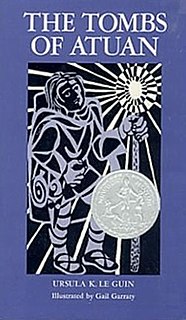
The Tombs of Atuan is a fantasy novel by the American author Ursula K. Le Guin, first published in the Winter 1970 issue of Worlds of Fantasy, and published as a book by Atheneum Books in 1971. It is the second book in the Earthsea series after A Wizard of Earthsea (1969). The Tombs of Atuan was a Newbery Honor Book in 1972.
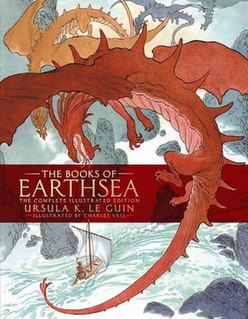
The Earthsea Cycle, also known as Earthsea, is a series of high fantasy books written by the American writer Ursula K. Le Guin. Beginning with A Wizard of Earthsea (1968), The Tombs of Atuan, (1970) and The Farthest Shore (1972), the series was continued in Tehanu (1990), and Tales from Earthsea and The Other Wind. In 2018, all the novels and short stories were published in a single volume, The Books of Earthsea: The Complete Illustrated Edition, with artwork by Charles Vess.

Tehanu, initially subtitled The Last Book of Earthsea, is a fantasy novel by the American author Ursula K. Le Guin, published by Atheneum in 1990. It is the fourth novel set in the fictional archipelago Earthsea, following almost twenty years after the first three Earthsea novels (1968–1972), and not the last, despite its subtitle. It won the annual Nebula Award for Best Novel and the Locus Award for Best Fantasy Novel.
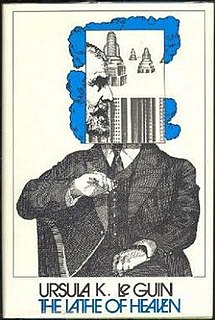
The Lathe of Heaven is a 1971 science fiction novel by American writer Ursula K. Le Guin. The plot concerns a character whose dreams alter past and present reality. The story was serialized in the American science fiction magazine Amazing Stories. The novel received nominations for the 1972 Hugo and the 1971 Nebula Award, and won the Locus Award for Best Novel in 1972. Two television film adaptations were released: the PBS production, The Lathe of Heaven (1980), and Lathe of Heaven (2002), a remake produced by the A&E Network.

The Word for World Is Forest is a science fiction novella by American writer Ursula K. Le Guin, first published in the United States in 1972 as a part of the anthology Again, Dangerous Visions, and published as a separate book in 1976 by Berkley Books. It is part of Le Guin's Hainish Cycle.

Dreamsnake is a 1978 science fiction novel by American writer Vonda N. McIntyre. It is an expansion of her 1973 novelette "Of Mist, and Grass, and Sand", for which she won her first Nebula Award. The story is set on Earth after a nuclear holocaust. The central character, Snake, is a healer who uses genetically modified serpents to cure sickness—one snake is an alien "dreamsnake", whose venom gives dying people pleasant dreams. The novel follows Snake as she seeks to replace her dreamsnake after its death.
"The Day Before the Revolution" is a science fiction short story by American writer Ursula K. Le Guin, first published in 1974.

"The Shobies' Story" is a 1990 science fiction novella by American writer Ursula K. Le Guin, describing the story of the first human crew to participate in a newly invented faster-than-light mode of space travel. It was first published in the anthology Universe 1 and subsequently appeared in A Fisherman of the Inland Sea published by Harper Prism in 1994.
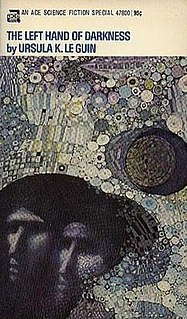
The Left Hand of Darkness is a science fiction novel by U.S. writer Ursula K. Le Guin. Published in 1969, it became immensely popular, and established Le Guin's status as a major author of science fiction. The novel is set in the fictional Hainish universe as part of the Hainish Cycle, a series of novels and short stories by Le Guin, which she introduced in the 1964 short story "The Dowry of Angyar". It was fourth in sequence of writing among the Hainish novels, preceded by City of Illusions, and followed by The Word for World Is Forest.

Ursula K. Le Guin (1929–2018) was an American author of speculative fiction, realistic fiction, non-fiction, screenplays, librettos, essays, poetry, speeches, translations, literary critiques, chapbooks, and children's fiction. She was primarily known for her works of speculative fiction. These include works set in the fictional world of Earthsea, stories in the Hainish Cycle, and standalone novels and short stories. Though frequently referred to as an author of science fiction, critics have described her work as being difficult to classify.
Earthsea is a fictional world originally created by Ursula K. Le Guin for her short story "The Word of Unbinding", published in 1964. Earthsea became the setting for a further six books, beginning with A Wizard of Earthsea, first published in 1968, and continuing with The Tombs of Atuan, The Farthest Shore, Tehanu, Tales from Earthsea and The Other Wind. Nine short stories by Le Guin are also set in Earthsea; the earliest two in her 1975 collection of short stories The Wind's Twelve Quarters, five in Tales from Earthsea, and the final two in an illustrated collection in The Books of Earthsea. Collectively, the series is simply known as Earthsea.

Gifts (2004) is a young adult fantasy novel by Ursula K. Le Guin. It is the first book in the Annals of the Western Shore trilogy, and is followed in the series by Voices. The story is set in a fictional world, in a barren and poverty-stricken region called the Uplands, some of whose inhabitants have hereditary magical gifts. The story follows the narrator Orrec, son of the leader of the domain of Caspromant, whose hereditary gift is the ability to "unmake", and Gry, the daughter of a neighboring domain, who can communicate with animals. Orrec's gift manifests late, and seems uncontrollable, and so he is blindfolded. Their families are caught up in the cycle of violent feuds and retribution that characterize Upland society in which the children are trying to find their place.
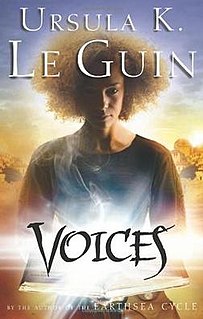
Voices (2006) is the second book in the trilogy Annals of the Western Shore, a young adult fantasy series by Ursula K. Le Guin. It is preceded in the series by Gifts (2004) and followed by Powers (2007). The story is set in the fictional city of Ansul, once famed as a center of learning, but invaded and subjugated by the Alds, a desert people who believe the written word to be evil. The protagonist, Memer Galva, is the child of a woman raped by an Ald soldier. She lives in the house of the Waylord Sulter Galva, who teaches her to read after finding she can enter the house's hidden library. When Memer is seventeen the city is visited by Gry and Orrec, the protagonists of Gifts; Orrec is now a famous poet, invited to perform by the Alds. Their arrival catalyzes an uprising against the Alds, while Memer tries to come to terms with her ability to interpret the Oracle that resides in her house.
Powers (2007) is the third book in the trilogy Annals of the Western Shore, sometimes called Chronicles of the Western Shore, a young adult series by Ursula K. Le Guin. It is preceded in the series by Voices. Powers won the 2008 Nebula Award for Best Novel.
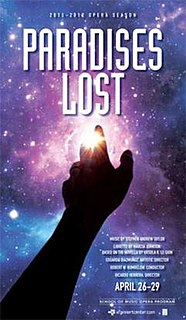
Paradises Lost is a science fiction novella by American author Ursula K. Le Guin. It was first published in 2002 as a part of the collection The Birthday of the World. It is set during a multigenerational voyage from Earth to a potentially habitable planet. The protagonists, Liu Hsing and Nova Luis, are members of the fifth generation born on the ship. The story follows them as they deal with members of religious cult who do not believe in the ship stopping at its intended destination. They also face a crisis brought on by a drastic change in the ship's schedule. The novella has since been anthologized as well as adapted into an opera of the same name.
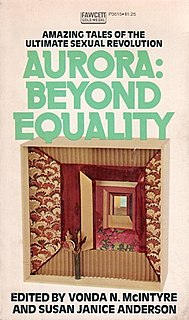
Aurora: Beyond Equality is an anthology of feminist science fiction edited by Vonda N. McIntyre and Susan Janice Anderson and published in 1976.
References
- 1 2 Walton, Jo (April 29, 2009). "A new island of stability: Ursula Le Guin's Annals of the Western Shore". Tor.com. Macmillan. Archived from the original on April 3, 2021.
- ↑ "2005 Literary Awards Winners". PEN Center USA. Archived from the original on November 7, 2005. Retrieved January 26, 2008.
- ↑ "2009 Nebula Winners". Locus Publications. Archived from the original on September 25, 2009. Retrieved September 5, 2012.
- ↑ "Children's Book Review: Gifts by Ursula K. Le Guin". Publishers Weekly. July 19, 2004. Archived from the original on September 30, 2020.
- ↑ Levy, Anne Boles (November 4, 2006). "Striking a fantastic blow on behalf of the magic of words". The Los Angeles Times. Archived from the original on August 1, 2021.
- ↑ Ellis, Sarah (September 8, 2007). "Fantasy in a bottle". The Globe and Mail. Archived from the original on January 15, 2009.
- 1 2 Goldstein, Lisa (October 30, 2006). "Voices by Ursula K. Le Guin". Strange Horizons. Archived from the original on February 20, 2017.
- ↑ Le Guin, Ursula K (September 1, 2006). Voices. Harcourt. ISBN 978-0-15-205678-0.